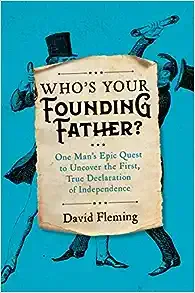
Who's Your Founding Father?: One Man's Quest to Uncover the First True Declaration of Independence
David Fleming
We all know who wrote the Declaration of Independence, right? If you never took a history class in your life, you would still know that Thomas Jefferson was the author, in the same way that we all know that George Washington was the country's first president. The knowledge is part of our collective consciousness. But sometimes collective wisdom, which is rarely nuanced, may be flawed. Because the knowledge is so fundamental, we neither question its validity nor are we open to others doubts.
In 1819, former president John Adams came across a news story in his local paper that was originally published in the Raleigh Register in North Carolina. According to the author, on May 20, 1775, more than a year before Thomas Jefferson wrote the Declaration of Independence that we are all familiar with, the patriots of Mecklenburg County declared independence from Great Britain and published their own Mecklenburg declaration now known as the MecDec. Patrick Jack ("Captain Jack"), a local tavern owner, rode 600 miles from Charlotte to Philadelphia to deliver the document to the North Carolina delegates to the Continental Congress. The delegates took the document and agreed to show it to the other delegates. Meeting again the next day with Captain Jack, the NC delegates said that after showing the MecDec to others including John Hancock, John Jay and Thomas Jefferson, it had been decided that the Mecklenburg patriots were moving too fast on the subject of independence. There was still some hope of reconciliation with Great Britain. Captain Jack is reported to have answered, "Gentlemen, you may debate here about 'reconciliation' and memorialize your king, but bear it in mind, Mecklenburg owes no allegiance to, and is separated from the crown of Great Britain forever." Fourteen months later, Thomas Jefferson produced his own Declaration of Independence that is remarkably similar in spirit and language to the MecDec.
I have lived in North Carolina most of my life and I am ashamed to say I had never heard of the MecDec until reading Fleming's book. I had never questioned why our license plates say First in Freedom and why the date May 20, 1775, appears on our state flag. David Fleming and his wife moved from Detroit to Charlotte in the early 2000s and was curious about the flag, street names, monuments, NBA mascot, police badges and public art all of which point to elements in the MecDec story. So, he investigated. As a reporter for Sports Illustrated, ESPN Magazine and the ESPN network, investigating and writing are two things Fleming does well. He takes a deep dive into the history of North Carolina. He doesn't confine himself to the colonial period but includes digressions on Humpy Wheeler, Cheerwine and Billy Graham among others.
Sometimes Fleming loses the focus of his story in all his digressions and his sense of humor and carefree writing style occasionally undercut the authoritative voice of a serious historian. Most troubling of all, is his relentless, almost personal, animosity towards Thomas Jefferson that degenerates into name calling at certain points. Despite these quibbles this is a fascinating book highly recommended for North Carolinians or those interested in NC history. There is even a Burke County connection as one of the principals in the creation of the MecDec was Waightstill Avery, whose family settled at Swan Ponds in Morganton. Charlotte has sporadically celebrated MecDec Day and Presidents Taft, Wilson, Eisenhower and Ford all attended celebrations during their time in office. Teddy Roosevelt had to cancel his trip but sent troops to represent the national government. Maybe Morganton, should consider a celebration too.
 Skip to main content
Skip to main content


